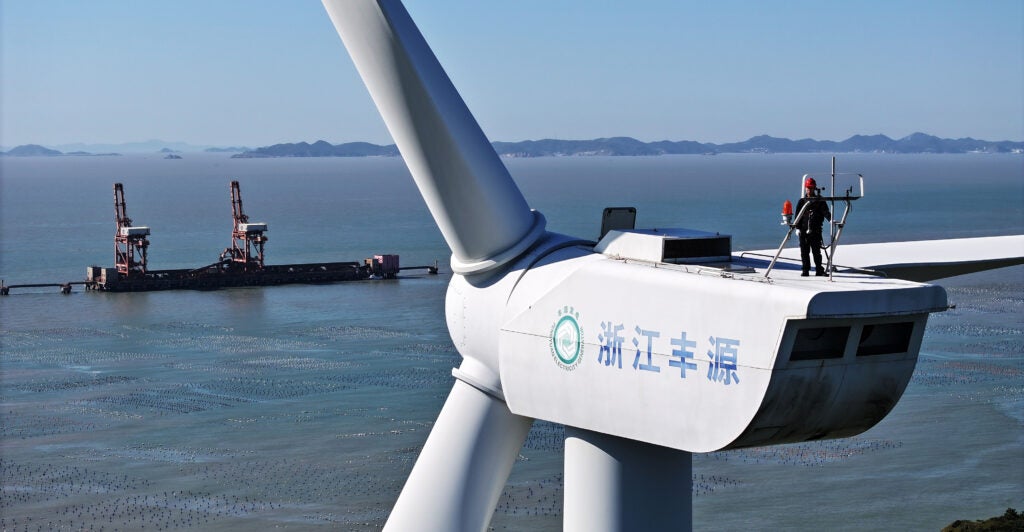China is operating in a “predatory” manner to make America more reliant on complex supply chains arising from climate change initiatives that play into the hands of hostile foreign actors, according to energy, environmental, and foreign policy analysts at a panel discussion Monday.
The event at The Heritage Foundation marked the launch of a new initiative, titled “Chinese Handcuffs,” that probes the Chinese Communist Party’s efforts to dominate the “green energy” sector in cooperation with left-leaning environmental activists in the U.S. (The Heritage Foundation founded The Daily Signal in 2014.)
Although the U.S. has sufficient resources to maintain its energy dominance, the Biden administration’s climate policies could enable the Chinese to gain significant economic and strategic advantages over time, the panelists warned.
“We are right now in the handcuffs of China, and this has been a multidecade agenda that they have led, but at the same time, our own liberal-left agenda has brought us to this point,” said Erin Walsh, a research fellow in international affairs for The Heritage Foundation. “… the United States is the No. 3 energy producer in the world, and China is the No. 1 energy importer in the world, and what they are trying to do is reverse this, so they become dominant in this new energy and renewable sector, and we become dependent on them.”
Walsh is also the co-author of a just released report, “Chinese Handcuffs: How China Exploits America’s Climate Agenda,” that explores how Beijing has been working to exploit America’s climate agenda to the advantage of the communist regime. Walsh noted that China does not have the oil and gas resources needed to meet its needs, which means it must rely on imports.
“For 1.4 billion people, they’ve got a lot they need to be dealing with,” she said. “Therefore, they knew they didn’t have the oil resources that the United States does, and nor did they have natural gas. So, what they wanted to do was to create these renewables.”
Other speakers discussed how China’s efforts to capture the wind and solar industry have complicated supply chains, putting the U.S. at a disadvantage. The “ambitious climate benchmarks” the Biden administration set for renewables heading into the 2030s will have significant economic and political ramifications, said Landon Derentz, a global energy security analyst with the Atlantic Council. The council is a Washington-based group devoted to promoting U.S. international leadership.
Derentz said the Biden administration would “probably not” be able to achieve its “climate benchmarks” without turning toward China, since the Asian giant has achieved dominance over solar energy manufacturing, the production of lithium batteries, and the extraction of rare earth minerals.
Meanwhile, China will continue to exploit the benefits of maintaining a “complex supply chain” while U.S. policymakers dither over how best to address Beijing’s grip on the renewable energy industry, Derentz said.
Victoria Coates, vice president for national security and foreign policy at The Heritage Foundation, served as the moderator for the discussion. She expressed concern the U.S. was “voluntarily” abdicating its energy security in the name of climate change even as China continues to operate in a “highly predatory, deliberate campaign” to overtake the U.S. in terms of energy and make the U.S. more dependent on China.
“The good news is, we can right this ship and reverse this if we take it seriously,” she added.
With an eye toward the 2024 elections, Coates asked Jack Spencer, an energy and environmental policy analyst with The Heritage Foundation, what to expect if a new administration were to take charge next year.
“I think what we will see under a conservative administration is a reversion back to allowing energy markets to work as they should,” Spencer said. “That doesn’t mean we will produce more or less energy. It means we will produce the amount of energy we need to feed the economy. If it’s more, we will be able to export more, to produce more, and to get those molecules where they need to go.”
Spencer criticized the Biden administration for curtailing natural gas exports and “taking massive swaths of federal land out of commission” from development. President Joe Biden’s hostility toward private industry has had the unfortunate effect of putting a “chill on investment” in meaningful energy initiatives, he said.
There’s a “Catch-22” at work where climate policies are concerned, Spencer added. Either the U.S. will become more dependent on China or it will devote large sectors of its energy industry toward what amounts to political fantasies, he warned. The solution, he added, is “to get off the hamster wheel of the green energy farce.”
